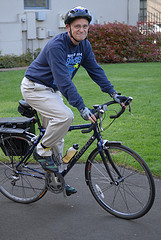U.S. Representative Earl Blumenauer (D-OR) introduced the Green Routes to Work Act of 2009 into Congress yesterday.
The bill looks to promote “low-carbon” transportation options by providing tax credits for both employers and individuals.
In a press release about the bill, Blumenauer states:
“With global warming on the rise, and Americans’ waistlines ever expanding, it is time to level the playing field for transportation options that are clean, healthy, and save people money at the pump…
For too long, the federal government has supported commuters who drove to work but has not helped those who use other methods of transportation.”
Blumenauer’s bill looks to address that disparity by extending employer incentives to biking, walking, and telecommuting (a phrase which is garnering more and more attention in the sustainable transportation world).
Here are the specific incentives included in the bill (copied from a statement distributed by Blumenauer’s office):
- Transit Equity: Increases the uniform dollar cap for all transportation fringe benefits to $230 a month.
- Clarification of Federal Employee Benefits: Encourages the federal government to lead by example by ensuring that federal transportation fringe benefits are available to federal employees.
- Self Employed Extension of Transportation Fringe Benefits: Allows individuals who are self-employed to receive transit fringe benefits for commuting done for work purposes.
- Parking Cashout: Requires employers who offer a parking transportation fringe benefit to employees to also offer employees the option to take cash instead, reducing the incentive to drive instead of take alternative transportation.
- VanPool Credit: Creates a 10% tax credit for expenditures on vanpool vehicles and services, which will provide an incentive for employers and employees to share their commutes.
- Employer Credit for Providing Tax-free Transit Passes to Employees: Gives employers an up to 10% tax credit for the money they provide to employees as part of the transportation fringe benefits program.
- Expenditures to Provide Bicycle Access: Encourages small businesses to provide for the growing interest in bicycle commuting by providing companies with a tax credit worth up to 50% of any expenditures used to make their business bike accessible.
- MultiModal Transportation: Allows individuals to combine their transportation fringe benefits as long as they fall under the $230 cap (for example, individuals can use the $40 bike credit and still collect up to $210 of their public transit fringe benefit). This section recognizes that people rarely use one type of transportation only to commute: they use a combination of modes depending on the weather, their needs for the day and other factors. It also increases the amount which individuals can receive under the bike commuter benefit to $40. [This component of the bill was introduced back in March.]
- Deductions for Expenditures to Remove Barriers to Bicycle Access: Allows individuals and business owners to deduct the costs of bicycle access improvements.
- Teleworking Tax Credit: Creates a tax credit for qualified teleworking expenses for employers and employees (up to $400 per individual teleworker). Four to six million workers currently telecommute at least once a week, saving an estimated 840 million gallons of fuel.
This is the most comprehensive effort yet by Blumenauer to improve on the anemic bike commuter tax benefit that was passed back in October as part of Obama’s federal economic stimulus bill.
Blumenauer staffers tell us that, if the transportation bill moves forward this session, they’ll try and get the Green Routes to Work Act folded into the Ways and Means financing section of the bill. If not, they’ll try and find a home for it in another tax bill.


